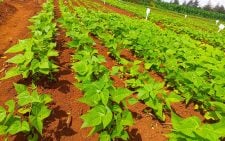Maize production projected to reach 76m bags this year

The country is likely to experience a food surplus for the first time in many years compared to the previous perennial shortages which led to growth in import bills.
Agriculture Cabinet Secretary Andrew Karanja confirmed that maize production for the 2024 long rains season is projected to reach 75.9 million bags of 50 kilogrammes compared to 47.6 million bags produced in 2023 accounting for an increase of close to 60 per cent.
The projected food yield, the CS noted, follows the government’s renewed and aggressive support to farmers in terms of farm inputs – subsidised fertiliser distribution since the 2022/2023 production year and relatively good weather.
Fertiliser subsidy
Karanja noted that in the 2022/2023 short rains Kenya Kwanza Government commenced the fertiliser subsidy programme to enhance agricultural production and ensure food security for all Kenyans by reducing the cost of fertiliser from Sh6,500 to the current Sh2,500 per 50Kg bag.
“A total of 6.45 million farmers have been successfully registered on the Kenya Integrated Agriculture Management Information System (KIAMIS), a platform that has enabled successful administering of the subsidy programme through the e-voucher,” he said in a statement on Friday.
Karanja explained that the fertiliser subsidy together with the relatively good weather has contributed to improved production of maize, a staple food that is highly consumed.
In line with the Bottom-up Economic Transformation Agenda of ensuring low cost of living, the government through the NCPB will immediately embark on purchasing one million of farmers’ maize at Sh3,500 per 90kg bag for the National Strategic Food Reserve (NSFR). Karanja noted the announced price of Sh3,500 per bag is intended to support farmers to maintain profit margins and it is in line with the prevailing farm gate price of Ksh2,835.
“The set price will also help to maintain the current price of Unga which is currently at Sh130 per 2kg packet,” he added.
The purchase of the one million bags is also to build up the NSFR currently at 30 per cent of the proposed quantities, the CS stated.









